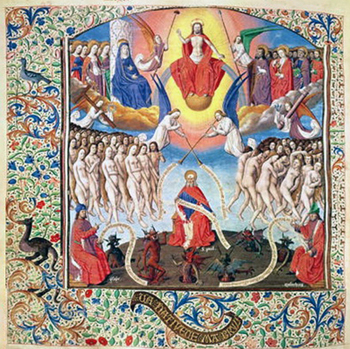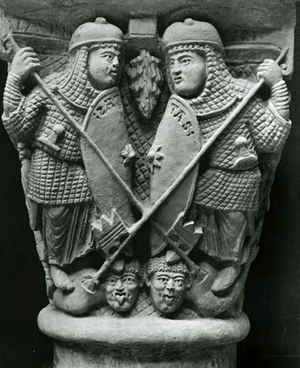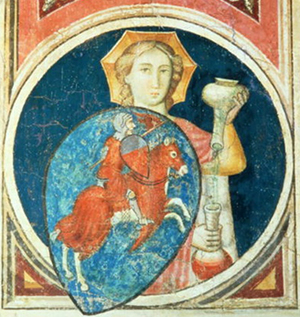 |
Catholic Virtues
This Is a Pre-Life
Michael W. Johnson, Ph.D.
Why are you taking this present form of earthly existence so seriously? You will never see its sufferings or pleasures again. This is not life; in fact, I like to refer to it as pre-life. In 1246 Our Lord gave St. Lutgarde seven heavenly promises.

In the Last Judgment the real life will start |
These promises define true life:
- Love without suffering,
- Life without death,
- Youth without age,
- Riches without poverty,
- Health without sickness,
- Joy without grief, and
- Everlasting peace under the perpetual grace of God.
It takes only a few seconds of reflection to conclude that such a life is infinitely preferable to what we currently experience.
Additionally, the body we regain in Heaven after the Last Judgment will possess four unsurpassable qualities – impassibility, subtlety, agility, and immortality. Briefly, impassibility is the total loss of the power of suffering. Subtlety is the power to penetrate the hardest of substances. Agility is the power of transporting ourselves with the rapidity of thought. And immortality is the incorruptibility of the glorified body.
Life is a test
So what is this life all about then? If you have not figured it out by now, it is a test, pure and simple. And, for our purposes, it is the simplest of tests – pass or fail. But do not be fooled by its simplicity. For it is the ultimate test for a human being.
Did you really think that seven such unsurpassed benefits will be handed to you without any effort on your part? Even in this life, one must labor for some pleasures, sometimes intensely and with great difficulty, but patiently and perseveringly. Why shouldn’t one have to work much harder for such incomparable promises? Indeed, why shouldn't one have to account for every single instant of a few decades of life on earth to achieve such magnanimous eternal benefits?
This life is like a poker game. A world-class poker player plays every hand. I am not impressed in the least by one who is dealt four aces or a royal flush and then proceeds to win the hand. He should have won it, and he is rather an incompetent poker player if he does not. I am far more impressed by someone who is constantly dealt twos, threes and fours, and still manages to win and stay in the game. In this life, one must deal with pain and suffering, disease and death, grief and sorrow, and numerous other weighty problems. An excellent indicator of one's character is how well one deals with these trying situations.
A person whose goal is to get to heaven must continuously evaluate every situation and act in such a manner as to merit heaven. But once you have acted (hopefully correctly), do not dwell on what you did or should not have done. You cannot change it regardless of how you acted. If you have acted incorrectly, make a mental note of it and resolve in the future to try to act correctly if you ever find yourself in a similar situation.
The trick is to form a character that habitually acts correctly each instant in such a way as to merit eternal life in Heaven.
A character worthy of eternal happiness
To form a character worthy of eternal happiness, one must be infused by God with the three theological virtues – faith, hope and charity - and one must also diligently work to acquire the four cardinal virtues – prudence, justice, fortitude and temperance.
When each virtue is fortified by one of the seven gifts of the Holy Ghost - wisdom, understanding, counsel, fortitude, knowledge, piety and fear of the Lord - then one has a highly probable chance of gaining Heaven. Nay, it can be argued that there no longer is a chance but a certainty. Incidentally, it is not mere coincidence that there are seven virtues and seven corresponding gifts of the Holy Spirit.

Charity & Magnanimity pierce the heart of the vices |
Let us clearly define our terms. According to St. Thomas Aquinas a virtue is a habit of right action while, conversely, a vice is a habit of bad action. Simply stated, a habit of right action leads to Heaven while a habit of bad action leads to Hell. A habit is the repetition of the same or nearly similar acts. It is not formed by a single act either right or wrong. The goal of the virtuous person is to share eternal happiness with God in Heaven. To make this the goal of life is the quintessence of human wisdom. The other virtues are the path to attain this goal.
The beginning of wisdom is fear of the Lord (Ps 111:10). This holy fear begets the first gift of the Holy Spirit. It unites with the first theological virtue — faith.
This fear of the Lord brings us to understand the second theological virtue — hope. For faith in the Lord leads us to hope to share eternal life in unimaginable happiness with the Lord. Our understanding of this promised eternal life is truly enhanced by the Holy Ghost’s gift of understanding.
Both of these theological virtues are primarily realized interiorly. At this juncture, the role of the cardinal virtues enter for us to attain our final goal.
There are traditionally four cardinal virtues in philosophy. They are prudence, justice, fortitude and temperance. The easiest way to define them is to use Socrates' "rightly series": Prudence is rightly counseling. Justice is rightly giving each his due. Fortitude is rightly fearing. And temperance is rightly choosing the means.

Prudence represented as a military virtue (Prato, Italy) |
Each of these four cardinal virtues is linked to a gift of the Holy Ghost. The easiest to understand is the virtue of fortitude, which is tied to the gift of fortitude. The next easiest to understand is prudence. Since prudence is "rightly counseling,” then it is clearly connected to the gift of counsel.
Piety is the gift that corresponds to the virtue of justice. This is a little tricky to understand until one realizes that piety refers to that subset of justice covered by religion — the justice that is due to Our Lord.
Finally, to choose the means central to the virtue of temperance, one must know all the various options that each action is capable of producing. Fully comprehending these options is the domain of the gift of knowledge.
The habitual practice of these virtues will result in the attainment of eternal life in Heaven. This is truly the highest wisdom because it embraces man's final goal.
Finally, the obvious gift to achieve that goal is the crowning gift of the Holy Ghost - wisdom. It corresponds to God's greatest theological virtue – charity.
When we understand what is the real life, the one that is eternal, we will be more serious on this earth and more carefully weigh our every action and purpose.

Posted April 13, 2012

Related Topics of Interest
 The Courage & Obedience of the Crusaders The Courage & Obedience of the Crusaders
 Courage and Dedication Courage and Dedication
 The Apostolate of Suffering The Apostolate of Suffering
 The Siege of the Alcazar in Toledo The Siege of the Alcazar in Toledo
 ‘Who Will Stand Up for Me against Evildoers?’ ‘Who Will Stand Up for Me against Evildoers?’
 The Military Virtues Every Catholic Must Have The Military Virtues Every Catholic Must Have

Related Works of Interest
|
|
Catholic Virtues | Religious | Home | Books | CDs | Search | Contact Us | Donate

© 2002- Tradition in Action, Inc. All Rights Reserved
|
 |
|